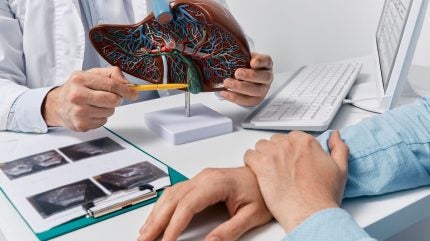
Gilead Sciences has reported promising two-year interim data from the ongoing Phase III ASSURE study of seladelpar in patients with primary biliary cholangitis (PBC).
The open-label trial is designed to assess the long-term safety and efficacy of seladelpar, an orally active peroxisome proliferator-activated receptor delta agonist.

Discover B2B Marketing That Performs
Combine business intelligence and editorial excellence to reach engaged professionals across 36 leading media platforms.
The ASSURE study is currently enrolling up to 500 individuals from 160 sites globally.
Participants have been administered seladelpar 10mg daily, with the current analysis covering up to 155 weeks of treatment.
The interim results include data from PBC patients who previously took part in any trials of seladelpar and participants from the pivotal Phase III RESPONSE study.
The findings revealed quick and lasting improvements in cholestasis markers, with increased rates of liver biomarker normalisation and significant pruritus reduction.

US Tariffs are shifting - will you react or anticipate?
Don’t let policy changes catch you off guard. Stay proactive with real-time data and expert analysis.
By GlobalDataFor subjects who completed the 12-month RESPONSE study and received 18 months of continuous seladelpar treatment in the ASSURE trial, 62% attained the composite response endpoint while 33% reached ALP normalisation.
Furthermore, for those treated with seladelpar for 24 months, 72% met the composite response endpoint, and 17% achieved ALP normalisation.
The study also showed that 75% of participants previously on placebo in the RESPONSE study met the composite response endpoint after six months of seladelpar treatment in the ASSURE study, with 27% achieving ALP normalisation. After 12 months, these figures rose to 94% and 50%, respectively.
The safety profile of seladelpar was favourable and well-tolerated over the long term, with no treatment-related serious adverse events reported by the study investigators.
In terms of pruritus, participants with a baseline NRS≥4 saw a sustained improvement, with a mean reduction of 3.8 and 3.1 points at 12 and 24 months, respectively.
The US Food and Drug Administration (FDA) has accepted the company’s new drug application for seladelpar for priority review. A decision on approval is expected in August this year.
The UK Medicines and Healthcare Products Regulatory Agency (MHRA) and the European Medicines Agency (EMA) are also reviewing the drug for PBC in adults.
Gilead Sciences Clinical Development of Inflammation Therapeutics vice-president Timothy Watkins said: “Given ALP is recognised as an important surrogate marker of disease progression in PBC, providers are shifting to normalisation as a treatment goal, which could potentially be enabled by seladelpar if approved.”
The latest development comes after the company announced the progression of subject enrolment in two Phase II collaborative studies of lenacapavir for HIV prevention.





